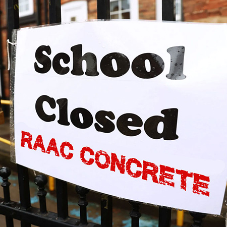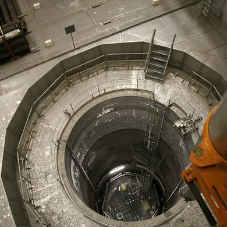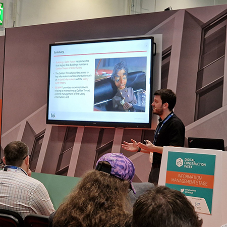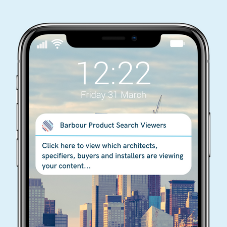UK Construction Week, the UK’s biggest construction event, took place this week at Birmingham’s National Exhibition Centre. Barbour were there every day to take in the sights and soak up as much knowledge as we could fit between our train journeys between Birmingham and the North West!
Our colleagues from Barbour Product Search, Barbour ABI and AMA Research were in position at our stand all week to demonstrate the many avenues in which we excel at providing construction data and showcasing manufacturer products from throughout the industry.
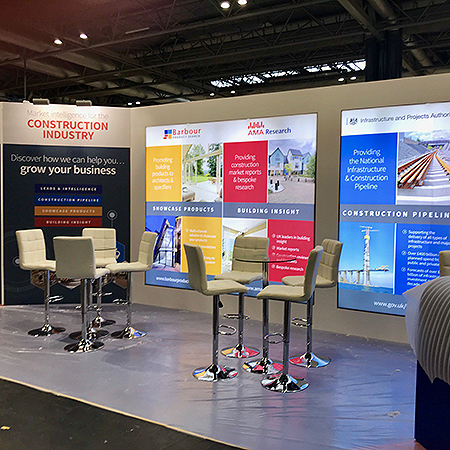
I arrived on the opening day of the exhibition and immediately set about attending the first event on my to-do list: a CPD topic presentation from Entuitive on how post-Grenfell fire safety legislation is affecting the timber building industry.
Having recently attended Sapphire Balconies fire safety CPD event in London, I wanted to make fire safety the focus of my visit to further expand my knowledge on such an important topic, and this was a great place to start.
One of the opening notes of the presentation that jumped out at me was the idea that fire safety has always been developed and innovated in the face of tragedy. Some of the first fire safety legislation in this country came in the wake of the Great Fire of London and throughout history the industry has continued to retroactively fix issues that have arisen since the most recent major fire tragedy.
In fairness, this reaction to tragedy seems logical. However, are some of the issues that cause fires avoidable and obvious before the fires occur? Should it not have been obvious before the Grenfell tragedy that combustible cladding on high-rise buildings would cause the issues that ended in disaster at Grenfell?
Something that the presenters from Entuitive touched upon multiple times is the idea that we need to go above and beyond what present legislation tells us to do, if we believe that the legislation doesn’t do enough to protect building inhabitants. Entuitive lead presenter Toby MacLean reiterated the point several times that “a safe building will be compliant. A compliant building may not necessarily be safe”.
Laziness, cheapness and a desire for a quick build can see new towers fly up, but if you know as a designer, manufacturer or builder that something isn’t safe, you should be empowered to put a halt to proceedings until this issue is adequately resolved. Morals must come above profit. This is a theme that I would see touched upon throughout the day.
The conclusion from Entuitive is that in the long-term post-Grenfell future we will see the use of timber on buildings fall, as the industry looks to minimise the chance of a similar event occurring again.
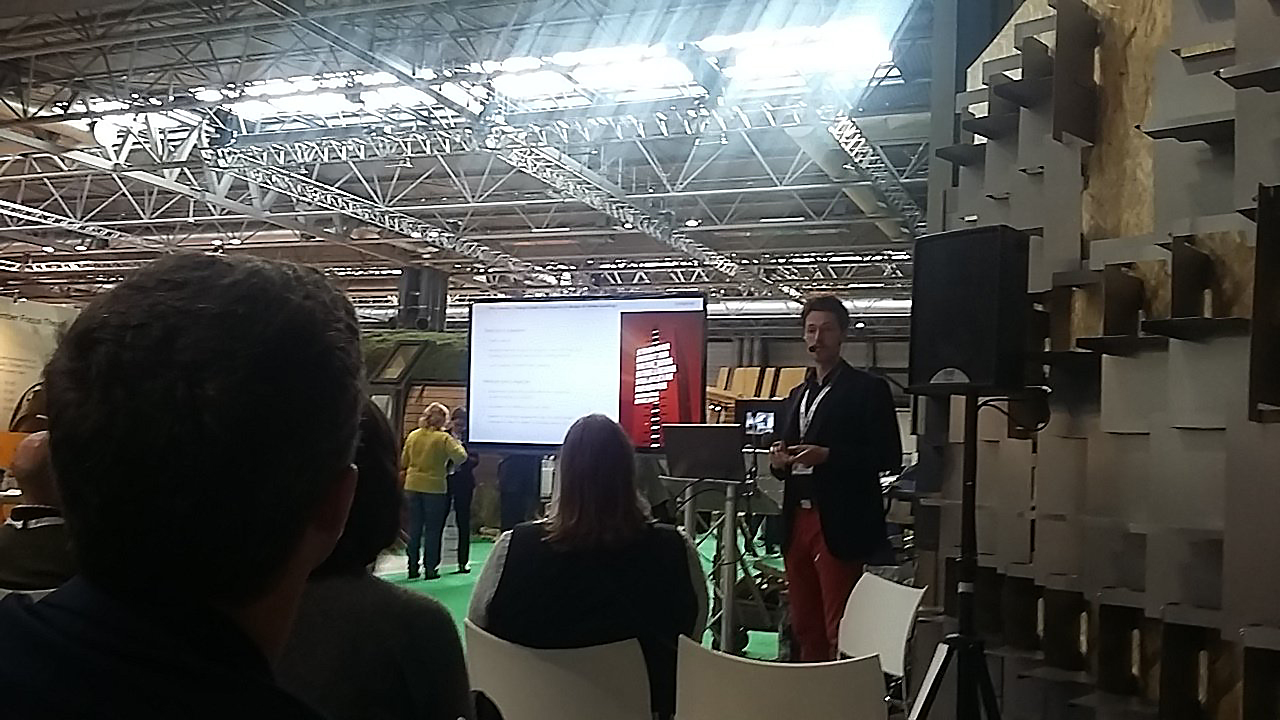
Furthermore, we will see a resistance from building occupants to adopt the ‘Defend in Place’ strategy, as it failed in such a massive and devastating way at Grenfell. How these changes affect the way fire safety occurs in this country in the coming months, years and decades will be a fascinating and important development for the construction industry to watch closely.
After this event was finished I headed to the Regeneration Hub to catch the fascinating ‘Regeneration & future-proofing of town centres & high streets’. This event was hosted by Kunle Barker and featured speeches from Geoff Pearce, Richard Cowell and Richard Roe, in which they presented case studies of some fine work from Swan Housing, Birmingham City Council and Trafford Council, respectively. It’s great to see such effort and funding being put back into the regeneration of some wonderful towns and cities in this country that have been underfunded for decades previously. If you would like to learn more about this excellent presentation then head over to Barbour ABI, where they discuss it in greater detail.
My final seminar of the day was ‘Fire safety & Building Regulations – Grenfell’, hosted by Martin Ryan and taking place in the Workplace Hub. Martin is Managing Director of MGR Fire and Facilities Consultants Ltd. Martin’s talk centred largely around the proposed ‘golden thread of information’ outlined in the Hackitt Report to try and ensure culpability and responsibility for fire safety through the digital recording of each stage from design and building all the way to eventual demolishment.
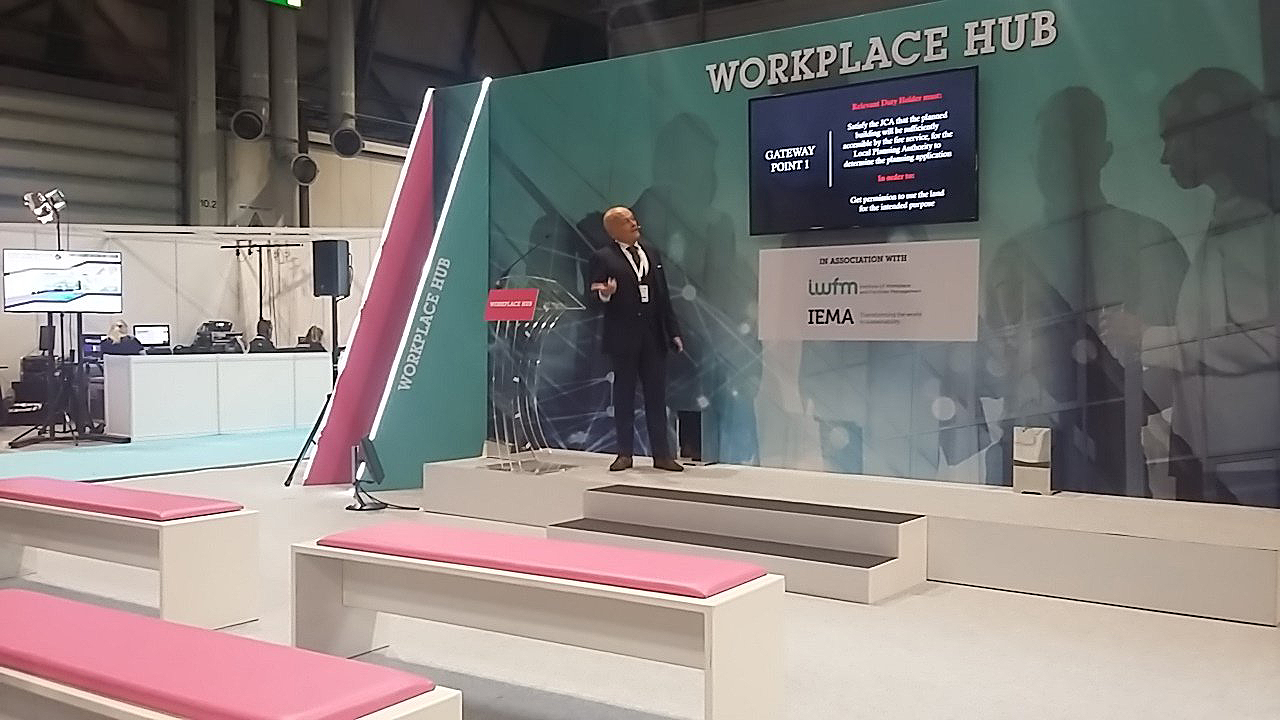
Similarly to Toby from Entuitive, Martin believed that too much emphasis was being placed on waiting for legislation to inform those in construction on how to act, rather than them acting out of common sense and morality.
Martin stressed the importance of slowing down at the planning and building stages to ensure that enough work is being done on safety concerns before it is too late. It was refreshing to see somebody within the industry state that it should be standard to wait an extra few months to get safety absolutely spot on, rather than quickly throwing up a building and hoping a disaster doesn’t occur.
As Martin pointed out, this approach would eventually save time and money down the line, due to lack of repairs needed for fires that would never break out. It, therefore, should be appealing to those who only care about maximising their profits in construction.
With the Grenfell tragedy still looming so large in British construction, it is no coincidence that the theme of safety and the pleas for caution and morality were so strong during my time at UK Construction Week. Upon my return to the event next year, I would be delighted to see that positive, actionable steps have been taken in order to follow these voices of reason.




